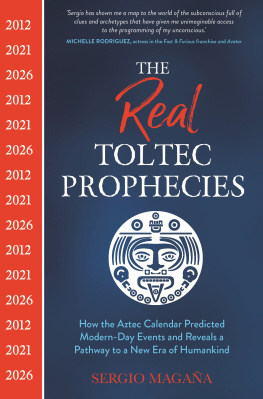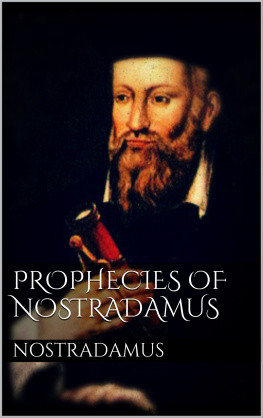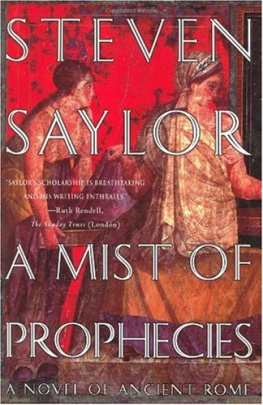Peter Bander - The Prophecies of St. Malachy
Here you can read online Peter Bander - The Prophecies of St. Malachy full text of the book (entire story) in english for free. Download pdf and epub, get meaning, cover and reviews about this ebook. year: 2016, publisher: TAN Books, genre: Detective and thriller. Description of the work, (preface) as well as reviews are available. Best literature library LitArk.com created for fans of good reading and offers a wide selection of genres:
Romance novel
Science fiction
Adventure
Detective
Science
History
Home and family
Prose
Art
Politics
Computer
Non-fiction
Religion
Business
Children
Humor
Choose a favorite category and find really read worthwhile books. Enjoy immersion in the world of imagination, feel the emotions of the characters or learn something new for yourself, make an fascinating discovery.

- Book:The Prophecies of St. Malachy
- Author:
- Publisher:TAN Books
- Genre:
- Year:2016
- Rating:3 / 5
- Favourites:Add to favourites
- Your mark:
- 60
- 1
- 2
- 3
- 4
- 5
The Prophecies of St. Malachy: summary, description and annotation
We offer to read an annotation, description, summary or preface (depends on what the author of the book "The Prophecies of St. Malachy" wrote himself). If you haven't found the necessary information about the book — write in the comments, we will try to find it.
The Prophecies of St. Malachy — read online for free the complete book (whole text) full work
Below is the text of the book, divided by pages. System saving the place of the last page read, allows you to conveniently read the book "The Prophecies of St. Malachy" online for free, without having to search again every time where you left off. Put a bookmark, and you can go to the page where you finished reading at any time.
Font size:
Interval:
Bookmark:

THE PROPHECIES
of ST. MALACHY
Introduction and Commentary by Peter Bander
Copyright Colin Smythe, Ltd., 1969
Library of Congress Catalog Card Number: 74-125419
ISBN: 0-89555-038-5
Originally published in 1969 by Colin Smythe, Ltd., Gerrards Cross, Buckinghamshire, England under the title The Prophecies of St. Malachy and St. Columbkille.
Originally published in the United States by Alba House, Division of the Society of St. Paul, Staten Island, New York in 1970 under the title The Prophecies of St. Malachy.
TAN Books
Charlotte, North Carolina
www.TANBooks.com
1973
Mr, Peter Bander
Senior Lecturer in Religious Education, and Head of the Department of Religious Education at one of the constituent colleges of the Cambridge Institute of Education.
Through the good services of Archbishop Cardinale, he has received the cooperation of the Vatican Archives, and the result is the most authoritative and enlightening edition of the prophecies ever to have appeared.
FOREWORD
In publishing THE PROPHECIES OF ST MALACHY Colin Smythe Limited have produced an instructive and entertaining book.
There is a great deal of instant information in Peter Bander's nutshell biographical accounts of the popes who occupied the Roman See since the year 1143 to our present time and indeed of the antipopes as well. The remarkable way in which the visions St Malachy is alleged to have had are shown to apply to the successive individual popes is most amusing. Is it not the case to repeat: "Se non vero, ben trovato"?
Whatever one may think of the genuineness of the prophecies attributed to St Malachy, here is a fascinating study which provides the curious reader with much profit and pleasure.
ARCHBISHOP H. E. CARDINALE
Apostolic Nuncio to Belgium and Luxembourg until recently Apostolic Delegate to Great Britain
PREFACE
If this book does no more than give pause to those scoffers who customarily go about saying that the Prophecies of Malachy are nothing other than scurrilous rubbish, it will have accomplished a great deal if only because there are so many people who tend to think this way. There is another group, of course, who have never heard of these famous foretellings of the popes by which the good Malachy undertook to list in advance the proper succession of Roman pontiffs from Celestine II (1143) to "the end of the world." He didn't just come right out and name them, of course. That would have taken all the sport out of it for one thing and, for another, would have considerably curtailed the free will of the College of Cardinals. Quite sensibly, he chose to reveal the successors under symbolic titles, set down in Latin.
I belong to yet a third group or belonged, I should say who had heard of the Prophecies but had not bothered to think much about their validity one way or the other. I could, as so many of my contemporary indifferentists are wont to say, not have cared less. But count me now among the utterly concerned and utterly converted. Peter Bander's commentary and interpretation of the prophecies have carried the day completely. So far as I'm concerned, there's not the least shadow of a doubt as to their authenticity.
The scoffers, of course, begin with the primary objection that these writings were not even "discovered" for some four-hundred odd years after Malachys' death in the year 1148. They object further that he would surely have told somebody about them, at least his death friend St. Bernard of Clairvaux; they carp and twitter and nit-pick in other disagreeable and tendentious ways as well. But to no avail the elegant and soaring scholarship of Peter Bander disposes of all these objections with authoritative dispatch. He remains too much the professional even to descend to the gut-level argument that I, laboring under no such restraining ethic, would have cited at once: namely, that Malachy was not only Irish, but an Irish saint, and the first Irishman to actually be canonized by formal process of the Church. Would such a man be apt to jeopardize his chances by leaving a notorious piece of scurrilous writing behind him?
There will be those, too, who say that it's easy enough to match up pope and prophetic clue after the fact. Thus we now know that when Malachy wrote Bos Albanus in Portu that he was obviously referring to Rodrigo Borgia, Alexander VI (1492-1503), because of "the pope's armorial bearings and his Cardinal titles of Albano and Porto." He also behaved like a bull on more than a few occasions so that the prediction "the Alban bull at the port" is not only literally but allegorically accurate. But the wicked Alexander is grossly obvious; it takes a knowledge of the papacy amounting almost to an obsession albeit a most lofty one to realize that Picus Inter Escas (A woodpecker among the food) was going to turn out to be Nicholas IV.
Interest in the prophecies is somewhat cyclical in nature, tending to go up sharply when the reigning pontiff grows extremely old or falls dangerously ill. Before and during actual conclaves it is next to impossible to lay your hands on a copy. Peter Bander's interpretations, filled as they are with the highly condensed soup of scholarship as well as with the lightning flashes of nearly pure inspiration, should soon be recognized as the authoritative version and will doubtless be in sharp demand.
Which makes me admire all the more the modesty of Peter Bander, who, having forged such a masterwork of authenticity can then step humbly aside and say, as he does in his introduction, that the reader need not "extend to them the same reverence you may extend to the Gospels."
Reverence no; but profound respect, certainly. Only once did the author strain my credulity and that so slightly as to be virtually insignificant. He circulates the rumor that during the conclave which was to elect John XXIII, a certain Cardinal from the United States, evidently having taken Malachy's forecast that the next pope would be "pastor and mariner" literally, rented a boat, filled it with sheep and sailed thus conspicuously up and down the Tiber. Pope John, of course, as bishop of Venice, had the maritime claim nailed down.
What disturbs me and should disturb the reader to an equal degree is that after "Flower of Flowers," that is to say after Paul VI, there are only three more prophecies. Whoever he turns out to be, Petrus Romanus will be the last. Time is running out. It's later than we all think. The end of the world is at hand. If Malachy and Peter Bander say it's going to happen, then happen it surely will.
Joel Wells
Editor, The Critic
PUBLISHER'S PREFACE
The present book was originally published by Colin Smythe, Limited, of Gerrards Cross, England in 1969 under the title The Prophecies of St. Malachy and St. Columbkille. In 1970 Alba House, a Division of the Society of St. Paul, Staten Island, New York, with the permission of Colin Smythe, Limited, brought out a hardbound edition of The Prophecies of St. Malachy only. That edition having gone out of print toward the end of 1972, and Alba House electing not to reprint, we negotiated with the original publisher to issue the book once more. We also have chosen to reprint only The Prophecies of St. Malachy because they form a unified subject matter; those of St. Columbkille (521-597) cover a longer period of time, concern many unrelated subjects, and are difficult to read and more difficult to understand (even with the help of Mr. Bander's footnotes). Added to this, they distract, in our opinion, from the powerful import of St. Malachy's prophecies.
Next pageFont size:
Interval:
Bookmark:
Similar books «The Prophecies of St. Malachy»
Look at similar books to The Prophecies of St. Malachy. We have selected literature similar in name and meaning in the hope of providing readers with more options to find new, interesting, not yet read works.
Discussion, reviews of the book The Prophecies of St. Malachy and just readers' own opinions. Leave your comments, write what you think about the work, its meaning or the main characters. Specify what exactly you liked and what you didn't like, and why you think so.










